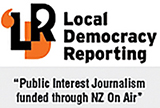Don't make us 'turtle town'

“Don’t turn Ashburton into turtle town,” Grant McFaul said as he told the Ashburton District Council its proposed reductions in its interim speed management plan went too far.
He called the proposed permanent 30kph zones “preposterous”.
The majority of the councillors agreed and recommended electronic variable speed signs be introduced at all schools, but it would come with a hefty price tag.
McFaul supported reduced speeds around schools, but not as the proposed permanent reduction.
“If [30kph] limits were imposed on a permanent basis the council is actually creating a problem, not solving a problem, as it will not be adhered to outside of school hours,” McFaul said.
While many submitters said the reductions went too far, the Ashburton Citizens Association wanted to see the 30kph zones expanded in the CBD, and introduced at other sites such as early education centres, resthomes and retirement villages.
McFaul’s suggestion was echoed by other submitters, against a permanent reduction but in favour of a reduction during specific times at the start and end of the school day, and those sentiments were then supported by councillors.
Roading manager Mark Chamberlain explained the council’s options were either a permanent reduction, or installing electronic variable signs that have a significant cost attached of around $10,000 per sign.
“We only have so much money to spend, and that’s why we have chosen to do the variable signs at rural schools,” Chamberlain said.
Councillor Tony Todd said it was “dumb” to have a permanent 30kph limit outside schools, while councillor Rodger Letham called it “overkill on a problem we don’t have”.
“We haven’t got a crash history outside of schools, we don’t want one either,” Chamberlain said.
“There isn’t a history of it, but that’s not to say we want to wait for one before we actually do anything.”
The councillors unanimously agreed to install variable 30kph speed signs at the rural schools, as a priority.
Seven of the 10 councillors then voted for variable 30kph speed limits at the schools in urban areas.
Ashburton Mayor Neil Brown said the submissions made it clear people didn’t want the permanent 30kph zones, but the alternative means “there will be cost implications”.
Exactly what the budget implications are and the proposed timing of the changes will be brought before the council once the revised interim speed management plan is adopted by the council before the end of the year.
Methven’s Murray Hawkes has labelled Waka Kotahi’s road to zero campaign as “lunacy” and that a certain number of deaths was acceptable.
Road to Zero is Waka Kotahi’s vision of zero deaths and serious injuries on New Zealand roads.
In his verbal submission on the interim speed management plan, Hawkes cited statistics that the road toll has decreased consistently since 1989.
“We are getting safer and safer roads because of something – probably better cars, arguable that we are better drivers,” Hawkes said. “Certainly it’s not because of increased regulation.”
Ashburton Mayor Neil Brown asked what was an acceptable road death toll figure, which drew Hawkes’ criticism of the Road to Zero campaign.
“It’s not going to work.
“Stop being woke and be intelligent.
“A certain level of road deaths is acceptable because they will happen.
“The figure we have at the moment is actually pretty good.”
The road death toll for 2022 is currently 339, already higher than the 320 in 2021.
Hawkes said signage of the existing speed limits around schools is inadequate, as was the enforcement, and improvements in those areas would be more beneficial than speed reductions.
- By Jonathan Leask

